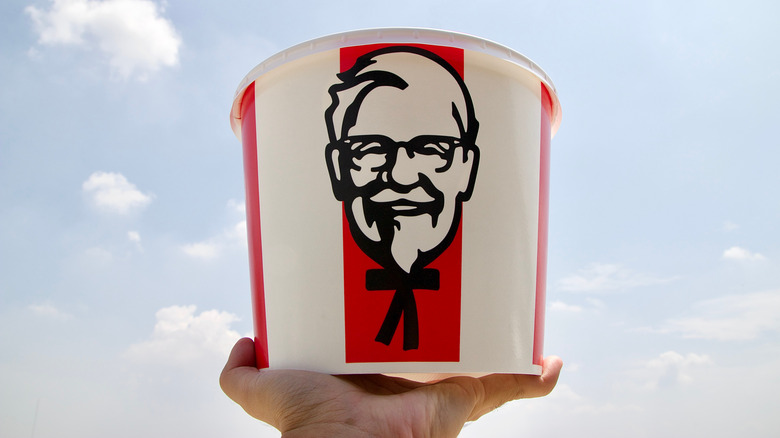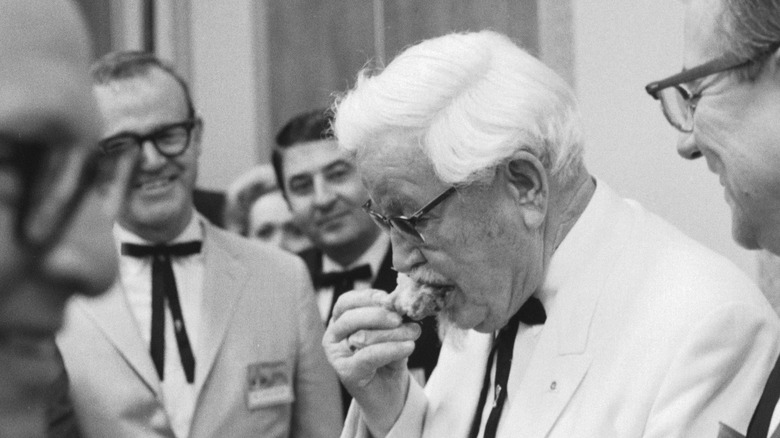The Strange, Lesser-Known Colonel Sanders Restaurant You Can Still Visit
Harland Sanders wasn't a colonel in the military sense (it was an honorary title bestowed on him by the state of Kentucky), but he sure lived like one. The gunslinging bad boy of the fast food world is a true American icon, and his life is the quintessential type of rags-to-riches story that this country loves so dearly.
He began cooking for his family at the tender age of six after his father's death, got kicked out of his home at age 12, and then went to work on a farm. He later cycled through almost every job in the book, from fighting fires to delivering babies, became a lawyer, and then got fired for brawling with his client in court. He didn't begin selling fried chicken until his 60s, and that hard-working (and hard-headed) attitude remained, ultimately putting him at odds with his fast-food empire.
Today, Sanders has achieved near-immortal status as his instantly-recognizable visage still graces every one of KFC's iconic buckets. However, the face of the Colonel that we all know, plastered with a smile, doesn't quite reflect his real feelings about KFC. As his business grew from a kitchen in a small-town Kentucky gas station to a global powerhouse, Sanders found himself at odds with his business partners on numerous occasions. Their relationship deteriorated to the point that the Colonel opened another restaurant, directly competing with the chain that bears his image.
Colonel Sanders actually hated KFC
Harland Sanders did not aim to start an international chain, but a massive change in the American landscape forced him into it. The Colonel's original restaurant was in Corbin, Kentucky, and is still there under the name Sanders Cafe, which functions as a museum and KFC restaurant.
However, in 1956, President Eisenhower prompted a seismic change in the life of Sanders and all Americans when he signed legislation establishing the United States Interstate Highway System. Over time, I-75 between Florida and Michigan diverted people away from Corbin. Sanders responded by franchising his fried chicken business, which swiftly grew to encompass hundreds of nationwide locations. The company became so successful that Sanders couldn't manage it alone. That's when the trouble started.
In 1964, Sanders sold KFC to businessmen John Brown Jr. and Jack Massey in exchange for two million dollars and a position as the company's spokesman. He'd later regret it as the new management significantly changed the Colonel's recipes, notably his gravy. In 1976, Sanders told The New York Times that KFC was now selling "The worst fried chicken I've ever seen" and likened their gravy to wallpaper paste. He heavily criticized KFC's leadership, which company executives countered by saying that his high standards weren't realistic for a large-scale business where every location was run differently. That didn't quell the Colonel's ire, so he returned to his fried chicken roots by competing with his own business.
Sanders named his new restaurant after his wife
By 1968, Harland Sanders lived in Shelbyville, Kentucky, with his former mistress-turned-wife, Claudia. When he decided to open another restaurant that would harken back to the down-home cooking of the original KFC, he called it The Colonel's Lady, later rechristened as Claudia Sanders Dinner House.
The new eatery stood adjacent to Blackwood Hall, the Sanders' 5,000 square foot home built in the 1860s, making it easy for the Colonel to keep a close eye on the business. KFC was none too happy with this development and sued Sanders for $120 million. The case was settled out of court for the much-reduced price of one million dollars, and as old age crept up on him, Sanders sold the Dinner House as well.
Unlike KFC, Claudia Sanders Dinner House has stayed true to its roots under subsequent management, offering sit-down service and a more varied menu than the fast food chain. Of course, you can still get the famous fried chicken and gravy (made the Sanders way), but there are also steaks, pork chops, catfish, and classics like country ham and the Kentucky hot brown. The original restaurant was destroyed by a fire in 1999 (one day after Mother's Day). It was swiftly rebuilt with updated kitchen facilities while retaining the same old-timey charm of the original. And so it stands today in Shelbyville, inviting diners to experience KFC as the Colonel would have wished.


